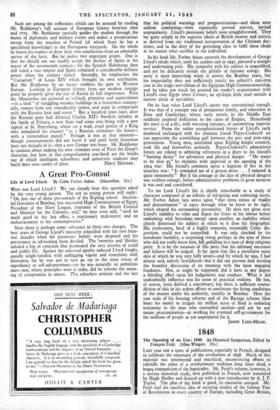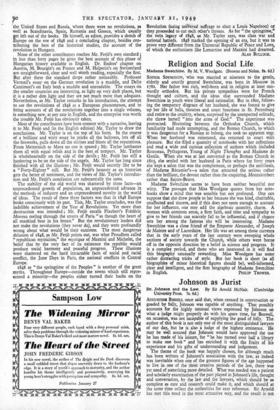1848
The Opening of an Era: 1848. An Historical Symposium, Edited by Francois Fetjts. (Allan Wingate. 21s.)
LAST year saw a spate of publications, especially in French, designed to celebrate the centenary of the revolutions of 1848. Much of this material was sentimental and uncritical, unconvincing efforts to rekindle the ashes of a revolutionary tradition long since dead, a bogus romanticism of the barricades. 'Mr. Fetio's volume, however, is a serious historical study, first published in French, now translated by Hugh Shelley and dressed up with a new introduction by A. J. P. Taylor. The plan of the book is good, its execution unequal. Mr. Feud had the excellent idea of securing studies of the famous Year of Revolutions in every country of Europe, including Great Britain, the United States and Russia, where there were no revolutions, as well as Scandinavia, Spain, Rumania and Greece, which usually get left out of the books. He himself, as editor, provides a sketch of Europe on the eve of 1848 and a concluding chapter, besides con- tributing the best of the historical studies, the account of the revolution in Hungary.
None of the other contributors reaches Mr. Fetjo's own standard ; in less than forty pages he gives the best account of this phase of Hungarian history available in English. Dr. Endres' chapter on Austria, M. Bourgin's on France and M. Halperin's on Switzerland are straightforward, clear and well worth reading, especially the first. But after these the standard drops rather noticeably. Professor Vermeil's essay on the German revolution is a muddle, and Delia Cantimori's on Italy both a muddle and unreadable. The essays on the smaller countries are interesting, as light on very dark places, but it is a rather dim light and they are not much more than adequate. Nevertheless, as Mr. Taylor remarks in his introduction, the attempt to see the revolutions of 1848 as a European phenomenon, and to bring accounts of all the revolutions together into a single volume is something new, at any rate in English, and the enterprise was worth the trouble Mr. Fetjo has obviously taken.
Most of the contributors have been content with a narrative, leaving it to Mr. Fetjo and (in the English edition) Mr. Taylor to draw the conclusions. Mr. Taylor is on the top of his form. In the course of a brilliant and witty essay he pricks all the balloons, lets off all the fireworks, pulls down all the shrines and blasts all the reputations. From Metternich to Marx no one is spared ; Mr. Taylor lambastes them all with equal relish and in the best of tempers. Mr. Taylor is wholeheartedly on the side of the devils; Mr. Fetjohas still a hankering to be on the side of the angels. Mr. Taylor has long since finished with all the illusions ; Mr. Fetjo would secretly like to be a " Forty-Eighter " still. But Mr. Fetjo's honesty as an historian gets the better of sentiment, and the views of Mr. Taylor's introduc- tion and Mr. Fetjo's conclusion are substantially the same.
The stability of the old world was shattered by three facts—an unprecedented growth of population, an unprecedented advance in the methods of industry and an unprecedented novelty in the world of ideas. The result of these three factors was that in 1848 Europe broke consciously with its past. This, Mr. Taylor concludes, was the indelible achievement of the Year of Revolutions. Yet more than destruction was intended ; Mr. Fetjo recalls Flaubert's Frederic Moreau reeling through the streets of Paris " as though the heart of all mankind beat in his breast." But the revolutionary leaders did not make the revolutions (they never do), and they were profoundly wrong about what would be their outcome. The most dangerous delusion of 1848, as Mr. Fetjo points out, was what Proudhon called "republican mysticism," the mystique of Mazzini and Michelet, the belief that by the very fact of its existence the republic would produce social harmony and peaceful progress. These illusions were shattered on the hard intractable facts of social and racial conflict, the June Days in Paris, the national conflicts in Central Europe. 1848 as " the springtime of the Peoples " is another of the great myths. Throughout Europe—outside the towns which still repre- sented a minority—the peoples either turned their backs on the
Revolution (using universal suffrage to elect a Louis Napoleon) og they proceeded to cut each other's throats. As for " the springtime," the twin legacy of 1848, as Mr. Taylor says, was class war and national hatreds. 1848 marked the opening of an era, but it was to prove very different from the Universal Republic of Peace and Love, of which the enthusiasts like Lamartine and Mazzini had dreamed.
ALAN BULLOCK.







































 Previous page
Previous page